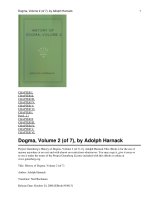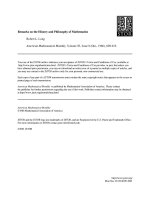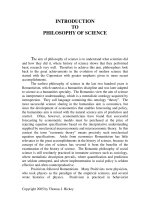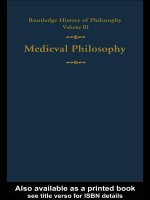- Trang chủ >>
- Khoa Học Tự Nhiên >>
- Vật lý
routledge history of philosophy volume viii twentieth-century continental philosophy - richard kearney
Bạn đang xem bản rút gọn của tài liệu. Xem và tải ngay bản đầy đủ của tài liệu tại đây (2.62 MB, 482 trang )
Routledge History of Philosophy, Volume VIII
Continental philosophy, as it has emerged in the twentieth century, is less a seamless
fabric than a patchwork of diverse strands. Phenomenology, hermeneutics, existentialism,
structuralism, critical theory, deconstruction—these are some of the salient movements
which have developed in continental Europe between 1900 and the 1990s, though thei
r
influence is by no means confined to geographical location. Continental thought has
p
roved highly exportable, circulating far beyond the frontiers of Europe to provoke
strong responses in the intellectual world at large.
The fourteen articles in this volume outline and assess some of the issues and
experiments of continental philosophy. The first five span the twin movements o
f
p
henomenology and existentialism, running from Husserl and Heidegger to Sartre,
Merleau-Ponty and Levinas. Subsequent essays deal with specific currents of continental
thought in such areas as science, Marxism, linguistics, politics, aesthetics, feminism and
hermeneutics. A final chapter on postmodernism highlights the manner in which so many
concerns of continental thought culminate in a radical anti-foundationalism.
This volume provides a broad, scholarly introduction to this period for students o
f
p
hilosophy and related disciplines, as well as some original interpretations of these
authors. It includes a glossary of technical terms and a chronological table o
f
philosophical, scientific and other cultural events.
Richard Kearney
is a Professor of Philosophy at University College, Dublin and a
Visiting Professor at Boston College. He is the author of Poetics of Modernity (1994),
P
oetics of Imagining (1991), The Wake of Imagination (1988),
M
odern Movements in
E
uropean Philosophy (1986) and Dialogues with Contemporary Continental Thinkers
(1984).
Routledge History of Philosophy
General editors—G.H.R.Parkinson and S.G.Shanker
The Routledge History of Philosophy provides a chronological survey of the history o
f
Western philosophy, from its beginnings in the sixth century BC to the present time. It
discusses all major philosophical developments in depth. Most space is allocated to those
individuals who, by common consent, are regarded as great philosophers. But lesse
r
figures have not been neglected, and together the ten volumes of the History include
b
asic and critical information about every significant philosophy of the past and present.
These philosophers are clearly situated within the cultural and, in particular, the scientific
context of their time.
The History is intended not only for the specialist, but also for the student and the general
reader. Each chapter is by an acknowledged authority in the field. The chapters are
written in an accessible style and a glossary of technical terms is provided in each
volume.
Routledge History of Philosophy
Volume VIII
Twentieth-Century
Continental Philosophy
EDITED BY
Richard Kearney
London and New York
First published 1994
by Routledge
11 New Fetter Lane, London EC4P 4EE
Simultaneously published in the USA and Canada
by Routledge
29 West 35th Street, New York, NY 10001
Routledge is an imprint of the Taylor & Francis Group
This edition published in the Taylor & Francis e-Library, 2005.
“To purchase your own copy of this or any of Taylor & Francis or Routledge’s
collection of thousands of eBooks please go to www.eBookstore.tandf.co.uk.”
© 1994 Richard Kearney and individual contributors
All rights reserved. No part of this book may be reprinted or reproduced or
utilized in any form or by any electronic, mechanical, or other means, now
known or hereafter invented, including photocopying and recording, or in any
information storage or retrieval system, without permission in writing from the
publishers.
British Library Cataloguing in Publication Data
Twentieth-Century Continental Philosophy—Routledge History of Philosophy
Series;
Vol. 8
I. Kearney, Richard
190.9
A catalogue record for this book is available from the British Library
Library of Congress Cataloging-in-Publication Data
Twentieth-century Continental philosophy/edited by Richard Kearney.
p. cm.—(Routledge history of philosophy: v. 8)
Includes bibliographical references and index.
1. Philosophy, Modern-20th century. 2. Philosophy, European.
I. Kearney, Richard. II. Series.
B804.T884 1994
190’.9’04–dc20
93–15763
ISBN 0-203-03067-2 Master e-book ISBN
ISBN 0-203-06010-5 (Adobe ebook Reader Format)
ISBN 0-415-05629-2 (Print Edition)
Contents
General editor’s preface
vi
Notes on contributors
viii
Chronology
xi
Introduction
Richard Kearney
1
1
The beginnings of phenomenology: Husserl and his predecessors
Richard Cobb-Stevens
5
2
Philosophy of existence 1: Heidegger
Jacques Taminiaux
32
3
Philosophy of existence 2: Sartre
Thomas R.Flynn
61
4
Philosophy of existence 3: Merleau-Ponty
Bernard Cullen
86
5
Philosophies of religion: Marcel, Jaspers, Levinas
William Desmond
108
6
Philosophies of science: Mach, Duhem, Bachelard
Babette E.Babich
144
7
Philosophies of Marxism: Lenin, Lukács, Gramsci, Althusser
Michael Kelly
184
8
Critical theory: Horkheimer, Adorno, Habermas
David Rasmussen
210
9
Hermeneutics: Gadamer and Ricoeur
G.B.Madison
240
10
Italian idealism and after: Gentile, Croce and others
Giacomo Rinaldi
289
11
French structuralism and after: de Saussure, Lévi-Strauss, Barthes,
Lacan, Foucault
Hugh J.Silverman
322
12
French feminist philosophy: de Beauvoir, Kristeva, Irigaray, Le
Doeuff, Cixous
Alison Ainley
338
13
Deconstruction and Derrida
Simon Critchley and Timothy Mooney
365
14
Postmodernist theory: Lyotard, Baudrillard and others
Thomas Docherty
392
Glossary
418
Index
423
General editors’ preface
The history of philosophy, as its name implies, represents a union of two very different
disciplines, each of which imposes severe constraints upon the other. As an exercise in
the history of ideas, it demands that one acquire a ‘period eye’: a thorough understanding
of how the thinkers whom it studies viewed the problems which they sought to resolve,
the conceptual frameworks in which they addressed these issues, their assumptions and
objectives, their blind spots and miscues. But as an exercise in philosophy, we are
engaged in much more than simply a descriptive task. There is a crucial aspect to ou
r
efforts: we are looking for the cogency as much as the development of an argument, fo
r
its bearing on questions which continue to preoccupy us as much as the impact which it
may have had on the evolution of philosophical thought.
The history of philosophy thus requires a delicate balancing act from its practitioners.
We read these writings with the full benefit of hindsight. We can see why the mino
r
contributions remained minor and where the grand systems broke down: sometimes as a
result of internal pressures, sometimes because of a failure to overcome an insuperable
obstacle, sometimes because of a dramatic technological or sociological change, and,
quite often, because of nothing more than a shift in intellectual fashion or interests. Yet,
b
ecause of our continuing philosophical concern with many of the same problems, we
cannot afford to look dispassionately at these works. We want to know what lessons are
to be learnt from the inconsequential or the glorious failures; many times we want to
p
lead for a contemporary relevance in the overlooked theory or to reconsider whether the
‘glorious failure’ was indeed such or simply ahead of its time: perhaps even ahead of its
author.
We find ourselves, therefore, much like the mythical ‘radical translator’ who has so
fascinated modern philosophers, trying to understand author’s ideas in their and thei
r
culture’s eyes, and at the same time, in our own. It can be a formidable task. Many times
we fail in the historical undertaking because our philosophical interests are so strong, o
r
lose sight of the latter because we are so enthralled by the former. But the nature o
f
p
hilosophy is such that we are compelled to master both techniques. For learning about
the history of philosophy is not just a challenging and engaging pastime: it is an essential
element in learning about the nature of philosophy—in grasping how philosophy is
intimately connected with and yet distinct from both history and science.
The Routledge History of Philosophy provides a chronological survey of the history o
f
Western philosophy, from its beginnings up to the present time. Its aim is to discuss all
major philosophical developments in depth, and, with this in mind, most space has been
allocated to those individuals who, by common consent, are regarded as great
p
hilosophers. But lesser figures have not been neglected, and it is hoped that the reade
r
will be able to find, in the ten volumes of the History, at least basic information about any
significant philosopher of the past or present.
Philosophical thinking does not occur in isolation from other human activities, and this
H
istory tries to situate philosophers within the cultural, and in particular the scientific,
context of their time. Some philosophers, indeed, would regard philosophy as merely
ancillary to the natural sciences; but even if this view is rejected, it can hardly be denied
that the sciences have had a great influence on what is now regarded as philosophy, and it
is important that this influence should be set forth clearly. Not that these volumes are
intended to provide a mere record of the factors that influenced philosophical thinking;
p
hilosophy is a discipline with its own standards of argument, and the presentation of the
ways in which these arguments have developed is the main concern of this History.
In speaking of ‘what is now regarded as philosophy’, we may have given the
impression that there now exists a single view of what philosophy is. This is certainly not
the case; on the contrary, there exist serious differences of opinion, among those who call
themselves philosophers, about the nature of their subject. These differences are reflected
in the existence at the present time of two main schools of thought, usually described as
‘analytic’ and ‘continental’
p
hilosophy respectively. It is not our intention, as general
editors of this History, to take sides in this dispute. Our attitude is one of tolerance, and
our hope is that these volumes will contribute to an understanding of how philosophers
have reached the positions which they now occupy.
One final comment. Philosophy has long been a highly technical subject, with its own
specialized vocabulary. This History is intended not only for the specialist but also for the
general reader. To this end, we have tried to ensure that each chapter is written in an
accessible style; and since technicalities are unavoidable, a glossary of technical terms is
p
rovided in each volume. In this way these volumes will, we hope, contribute to a wide
r
understanding of a subject which is of the highest importance to all thinking people.
G.H.R.Parkinson
S.G.Shanke
r
Notes on contributors
Alison Ainley
is Lecturer in Philosophy at Anglia Polytechnic University, Cambridge,
and author of a forthcoming book on Luce Irigaray.
Babette Babich
is Professor of Philosophy at Fordham University, New York, and
author of several studies on continental thought.
Richard Cobb-Stevens
is Head of the Philosophy Department at Boston College and
author of James and Husserl (1974) and Husserl and Analytic Philosophy (1989).
Simon Critchley
is Lecturer in Philosophy at the University of Essex and author of The
Ethics of Deconstruction (1992) and co-editor of Re-Reading Levinas (1991).
Bernard Cullen
is a Professor of Philosophy at Queen’s University, Belfast, editor of the
Irish Philosophical Journal and author of Hegel and Political Theory.
William Desmond
is Chair of Philosophy at Loyola College, Baltimore, visiting
professor at Louvain University and author of Desire, Dialectic and Otherness (1988),
Art and the Absolute (1986) and Philosophy and its Others (1991).
Thomas Docherty
is Chair of the Department of English at Trinity College, Dublin an
d
author of On Modern Authority (1987), Reading (Absent) Character (1983),
J
ohn
Donne, Undone (1986) and After Theory (1991).
Thomas R.Flynn
is Professor of Philosophy at Emory University and author of several
studies of modern continental thought.
Michael Kelly
is Professor of French at the University of South-hampton, and author o
f
several books including Modern French Marxism (1982).
Gary Madison
is Professor of Philosophy at McMaster University, Canada and founder-
director of the Canadian Society of Hermeneutics and Postmodern Thought. He is the
author of Phénoménologie de Merleau-Ponty (1973), Understanding (1982), Logic o
f
Liberty (1986) and Hermeneutics of Postmodernity (1988).
Timothy Mooney
is a Lecturer in Philosophy at University College, Dublin, and autho
r
of several studies of modern European thought.
Mara Rainwater
is a Lecturer in Philosophy at University College, Dublin. Her special
areas of interest include Critical Theory, Nietzsche, and Communicative Ethics.
David Rasmussen
is Professor of Philosophy at Boston College, founder-editor of the
journal Philosophy and Social Criticism and author of Reading Habermas (1991).
Giacomo Rinaldi
is Professor of Philosophy at the University of Urbino and an expert in
German and Italian idealist philosophy.
Hugh J.Silverman
is Professor of Philosophy and Comparative Literature at the State
University of New York at Stony Brook and author of
I
nscriptions: Between
Phenomenology and Structuralism (1987), editor of Philosophy and Non-Philosophy
since Merleau-Ponty (1988) and Executive Director of the International Association
for Philosophy and Literature.
Jacques Taminiaux
is Professor of Philosophy at the University of Louvain and Boston
College, Director of the Centre d’études phénoménologiques at Louvain University,
and author of many books on continental philosophy including Dialectic and Difference
(1985), Heidegger’s Project of Fundamental Ontology (1991) and Poetics,
Speculations and Judgment (1994).
This page intentionally left blank.
Chronology
Mara Rainwater, University College Dublin
Unless otherwise specified, the dates assigned to books or articles are the dates o
f
p
ublication, and the dates assigned to musical or stage works are those of first
p
erformance. The titles of works not written in English have been translated, unless they
are better known in their original form.
Continental philosophy: roots and
dialo
g
ue
The arts
1755 Rousseau, Discourse on the Origin of
I
nequality
1756 Voltaire, ‘Poem on the Disaster at
Lisbon’ (1755 earthquake)
1759 Hamann, Socratic Memorabilia Sterne, Tristram Shandy
Voltaire, Candide
1762 Rousseau, Emile
Rousseau, The Social Contrac
t
Diderot, Rameau’s Nephew
1764 Voltaire,
P
hilosophical Dictionar
y
1765
1766 Lessing, Laöcoon
‘Sturm und Drang’ Movement to
1787 (Goethe, Schiller, Herder)
1772 Herder, On the Ori
g
in o
f
Lan
g
ua
g
e
1774 Goethe, The Sorrows of Young
Werthe
r
1779 Lessin
g
, Nathan the Wise
1781 Kant, Critique of Pure Reason (‘A’
edition)
Schiller, The Robbers
1783 Kant, Prolegomena to any Future
M
etaph
y
sics
1784 Herder, Outlines of the Philosophy of the
H
istory of Mankind (4 vols, 1784–91)
Kant, ‘Idea for a Universal Histor
y
’
Beaumarchais, The Marriage of
F
igaro
1785 Kant, Foundations of the Metaphysics of
M
orals
1787 Jacobi, ‘On the Transcendental Idealism’
Kant, Critique of Pure Reason (‘B’
Mozart, Don Giovanni
Schiller, Don Carlos
edition)
Science and technolo
gy
Politics
Magnesium discovered (Davy) War between French and British in North
America
Lisbon earthquake kills 35,000
1755
Seven Years War in Europe (1756–63) 1756
French defeated in Quebec b
y
British 1759
Catherine II (The Great); Tsarina 1762–96 1762
Spinning jenny (Hargreaves) 1764
Condensing steam engine
(Watt)
Joseph II of Austria; Holy Roman Emperor
until 1790
1765
Hydrogen discovered
(Cavendish)
1766
N
itrogen discovered
(Rutherford)
Poland partitioned among Russia, Prussia,
and Austria
1772
Ox
yg
en (Priestl
y
and Scheele) Louis XVI; Kin
g
of France (to 1792) 1774
First cast-iron bridge at
Coalbrookdale, Shropshire
Spain joins French and Americans against
Britain
1779
British surrender to French and American
forces at Yorktown, Vir
g
inia
1781
First successful hot-air balloon
(Mont
g
olfier brothers)
Treaty of Paris ending American War of
Independence
1783
1784
Power loom (Cartwright) Frederick the Great establishes League of
German Princes a
g
ainst Joseph II of Austria
1785
French Assembly dismissed for refusal to
introduce financial reforms
1787
Continental
p
hiloso
p
h
y
: roots and dialo
g
ue The arts
1788 Kant, Critique o
f
Practical Reason Goethe,
Eg
mon
t
1789 Blake, Son
g
s o
f
Innocence
1790 Kant, Critique o
f
Jud
g
men
t
1791 Mozart, The Ma
g
ic Flute
1792 Fichte, Attempt at a Critique of All Revelation
Wollstonecraft, Vindication of the Rights of
Women
1793
1794 Condorcet, Sketch for a Historical Picture of the
H
uman Mind Fichte, Jena Wissenscha
f
tslehre
Blake, Songs of Experience
1795 Schelling, Philosophical Letters on Dogmatism Goethe, Wilhelm Meister’s
and Criticism
von Humboldt, On Thought and Language
A
pprenticeship
Schiller, On the Aesthetic
E
ducation o
f
Mankind
1796
1797 Kant, Metaphysics of Morals
Schelling, Ideas for a Philosophy of Nature
Goethe and Schiller,
B
allads
Hölderlin, H
y
perion
1798 Wordsworth and Coleridge,
L
yrical Ballads
1799 Schleiermacher, ‘On Religion’
von Humboldt, Aesthetic Essays
Goya, Los Caprichos
Schiller, Wallenstein’s
D
eath
Schle
g
el, Lucinde
1800 Fichte, The Vocation of Man
Schelling, System of Transcendental Idealism
Schleiermacher translates Plato into German
(1800–28)
Beethoven, First Symphony
N
ovalis, Hymn to the Night
1802 Mme. de Stael, Delphine
N
ovalis, Heinrich von
O
f
terdin
g
en
1804 Schiller, Wilhelm Tell
1807 Hegel, Phenomenology of Spirit (Jena) Beethoven, Fourth
S
y
mphon
y
Science and technolo
gy
Politics
First convicts shipped from Britain to
Australia
1788
Theory of Combustion
(Lavoisier)
Storming of the Bastille, Paris; the French
Revolution be
g
ins
1789
1790
Metric system proposed by
France
Louis XVI and family captured; he affirms
new French Constitution
1791
France declared a Republic; Austria and
Prussia unite a
g
ainst France
1792
Cotton gin (Whitney) Louis XVI and Marie Antoinette executed;
Reign of Terror under Robespierre
1793
Danton and Robespierre executed; ends
Rei
g
n of Terror
1794
France makes peace with Spain and Prussia 1795
Lithography invented
(Senefelder) Laplace, System
o
f
the World
N
apoleon Bonaparte leads French army to
conquer Italy
1796
1797
Malthus, Essay on the
P
rinciple of Population
French occupy Rome, Switzerland, Egypt;
Vinegar Hill Rebellion in Ireland for
separation from Britain
1798
N
apoleon rules France as Consulate until
1804
1799
First electric batter
y
(Volta) 1800
Bonaparte created First Consul for life 1802
Steam locomotive (Trevithick)
N
apoleon crowns self Emperor ‘Napoleon I’
and the First Empire be
g
ins
1804
The Clermont, first steamship
(Fulton)
British abolish slave trade throughout their
empire
1807
Continental
p
hiloso
p
h
y
: roots and dialo
g
ue The arts
1808 Goethe,
F
aus
t
(Pt I)
1809 Schelling, Philosophical Inquiries into the
N
ature o
f
Human Freedom
Chateaubriand, Les Martyrs
1811
1812 Hegel, Science of Logic (3 vols, 1812–16)
1813 Schopenhauer, On the Fourfold Root of the
P
rinciple o
f
Su
ff
icient Reason
1814 Go
y
a,
E
xecutions o
f
3rd Ma
y
1815 de Tracy, Elements of Ideology (4 vols, 1801–
15)
Schopenhauer, On Vision and Colours
1817 Hegel, Encyclopedia of the Philosophical
Sciences
1818 Schopenhauer, The World as Will and
R
epresentation
Grillparzer, Sappho
1820 Lamartine,
M
editations
1821 Hegel, Philosophy of Right
Schleiermacher, The Christian Faith (2 vols)
De Quincey, Confessions of
an Opium Eater
Heine,
P
oems
1822
1825 Saint-Simon, The New Christianit
y
1826 Hölderlin, L
y
rical Poems
1827
1830 Comte, Positive Philosophy (6 vols, 1830–42)
Feuerbach, Thoughts Concerning Death and
I
mmortality
Berlioz, Symphonie
F
antastique
Stendhal, The Red and the
B
lac
k
1831
1832 Goethe,
F
aus
t
(Pt II)
1837 Bolzano, Scientific Writings (4 vols) Balzac, Lost Illusions (1837–
43)
Science and technolo
gy
Politics
French occupy Spain; Joseph Bonaparte
b
ecomes Kin
g
of Spain
1808
1809
Avogadro’s Molecular Hypothesis Luddite riots in England against
mechanization in the textile industr
y
1811
500,000 of Napoleon’s army die in
retreat from Moscow
1812
Coalition of Austria, Prussia, Russia,
Britain and Sweden invades France
1813
Laplace, A Philosophical Essay on
P
robabilities
Treaty of Paris ends Napoleonic Wars;
N
apoleon abdicates and is exiled to Elba;
Con
g
ress of Vienna
1814
N
apoleon escapes Elba; marches on
Paris; Battle of Waterloo; Napoleon
exiled to St Helena
1815
Kaleidoscope (Brewster) 1817
Aix-la-Chapelle: France joins great
p
owers in Quintuple Alliance
1818
Electromagnetism (Oersted) Liberal revolutions in Spain, Portugal,
and Ital
y
1820
1821
Camera (Niepce) 1822
Electromagnet (Sturgeon) In Russia, Decembrist Rising against
Tsar
1825
Laws of Electromagnetism
(Ampère) First permanent
p
hoto
g
raph (Niepce)
1826
Ohm’s Law of Electromagnetic
Conduction
1827
Lyell, Principles of Geology (3
vols)
Paris July Revolution
Charles X overthrown; Louis-Philippe
Kin
g
(to 1848)
1830
Electromagnetic induction
(Farada
y
and Henr
y
)
Mazzini forms ‘Young Italy’ movement;
Polish revolution crushed b
y
Russians
1831
Reform Act passed in Britain 1832
Tele
g
raph (Morse) Victoria Queen of En
g
land (to 1901) 1837
Continental philosophy: roots and
dialo
g
ue
The arts
1839 Feuerbach, Towards a Critique of
H
e
g
elian Philosoph
y
1841 Feuerbach, The Essence of Christianity
Proudhon, What Is Property?
Emerson, Essays (1841–4)
Turner, Snowstorm—Steamboat off a
H
arbou
r
’s Mouth
1842 Gogol, Dead Souls
G.Sand, Consuelo
1843 Feuerbach, Provisional Theses
Kierkegaard, Fear and Trembling
Kierkegaard, Repetition
Kierkegaard, Either/Or
Marx, Critique of Hegel’s Philosophy
o
f
Ri
g
h
t
Ruskin, Modern Painters
1844 Kierkegaard, The Concept of Dread
Marx, The Paris Manuscripts
Stirner, The E
g
o and Its Own
Chateaubriand, Life of Rancé
1845 Marx, Theses on Feuerbach
Marx and En
g
els, The Hol
y
Famil
y
Gautier, España
1846 Kierkegaard, Concluding Unscientific
P
ostscrip
t
Marx and Engels, The German
I
deology
Michelet, The People
1848 Marx and Engels, Communist
M
ani
f
esto
1851 Proudhon, General Idea of the
R
evolution in the 19th Centur
y
Sainte-Beuve, Lundis
1852 Grimm, German Dictionary (vol. 1,
1852–4)
1854
N
erval,
A
u
r
élia
1855 Transformation of Paris by
Haussmann
1857 Marx, drafts Grundrisse Flaubert, Madame Bovary
Baudelaire, Les Fleurs du mal
1859
1862 Brentano, On the Manifold Sense of
B
ein
g
in Aristotle
Hugo, Les Misérables
Tur
g
enev,
F
athers and Sons
1863 Proudhon, On the Federal Principle Salon des Refusés—Paris
Tolsto
y
, War and Peace (1863–9)
Science and technolo
gy
Politics
Vulcanized rubber (Goodyear)
Ozone discovered (Schönbein)
Opium War between China
and Britain
1839
1841
‘Doppler Effect’ predicted the apparent change
in wavelength when the observer and wave
source are in relative motion (C.Doppler)
Hong Kong ceded to Britain 1842
N
atal becomes British
colony
1843
1844
1845
Planet Neptune discovered (Galle)
Sewin
g
machine (Howe)
Potato famine in Ireland (a
million dead b
y
1851)
1846
Revolutions throughout
Europe
Louis-Philippe abdicates in
Paris
1848
Bakunin imprisoned by Tsar
(1851–7)
1851
G
y
roscope (L.Foucault) 1852
Crimean War: France,
Britain, and Turkey against
Russia (to 1856)
1854
Celluloid (Parkes)
Conversion process for steel (Bessemer)
1855
Indian mutiny (Lucknow)
against Britain
1857
Darwin, The Origin of Species
Internal combustion en
g
ine (Lenoir)
1859
Rapid repeat-fire gun (Gatling) Bismarck becomes Prime
Minister in Prussia
1862
French occupation of
Mexico City
Lincoln emancipates slaves
1863
Continental
p
hiloso
p
h
y
: roots and dialo
g
ueThe arts
1864 Dostoyevsky, Notes from
Under
g
round
1865 Taine,
P
hilosoph
y
o
f
Ar
t
Wa
g
ner, Tristan and Isolde
1866 Dostoyevsky, Crime and
P
unishmen
t
1867 Marx,
D
as Kapital Ibsen,
P
eer G
y
n
t
1869 Wagner, Ring Series produced
1869–76
1870 Dilthe
y
, The Li
f
e o
f
Schleiermache
r
Rosetti,
P
oems
1871 Zola, Rougon-Macquart
Series
1873
N
ietzsche, Untimely Meditations
Stumpf, On the Psychological Origin of the
I
dea of Space
Rimbaud, A Season in Hell
1874 Brentano, Psychology from an Empirical
Standpoin
t
First Impressionist Exhibition
in Paris
1876 Tur
g
enev, Vir
g
in Soil
1877 Rodin,
Ag
e o
f
Bronze
1879 Fre
g
e, The Foundations o
f
Arithmetic Ibsen,
A
Doll
’
s
House
1880 French Symbolist Movement
(1880–95)
Mallarmé, Verlaine
1882
N
ietzsche, The Gay Science Wagner, Parsifal
1883 Dilthey, Introduction to the Human Sciences
Mach, The Science o
f
Mechanics
1885 Cézanne, Mont S.Victoire
Van Gogh, The Potato-Eaters
Van Go
g
h, The Sun
f
lowers
1886
N
ietzsche, Beyond Good and Evil Pointillism (Seurat, Signac,
Luce)
1887 Husserl, On the Concept of Number: A
P
sychological Analysis
N
ietzsche, On the Genealo
gy
o
f
Morals
Strindberg, The Father
Science and technolo
gy
Politics
Maxwell’s Electromagnetic
Theor
y
of Li
g
ht
Marx founds First International in London;
Bakunin challen
g
es his leadership
1864
End of American Civil War; Lincoln
assassinated
1865
D
y
namite invented (Nobel) Treat
y
of Paris ends Austro-Prussian War 1866
Typewriter (Scholes) Prussian leadership of North German
Confederation
1867
Periodic arrangement of
elements (Mendeleev)
1869
Kingdom of Italy annexes Papal States
French Third Republic be
g
ins
1870
Darwin, ‘The Descent of Man’ Paris Commune crushed
German Empire declared b
y
Wilhelm I
1871
First Republic of Spain (to 1874) 1873
1874
Telephone (Bell) Britain and France take joint control of
E
gy
p
t
’s finances
1876
Phono
g
raph (Edison) Queen Victoria as Empress of India 1877
Incandescent lamp (Edison) Irish Land Lea
g
ue under Parnell 1879
Boers revolt against British control in South
Africa
1880
Triple Alliance: Germany, Austria, Italy (to
1914)
1882
Health insurance introduced in German
y
1883
First rabies innoculation
(Pasteur)
Electric transformer (Stanle
y
)
French protectorate over Indochina 1885
Electromagnetic waves
discovered (Hertz)
Gladstone’s Irish Home Rule Bill defeated in
Parliament
1886
Gramophone (Berliner)
Motor car engine (Daimler and
Benz)
Italy and Ethiopia at war 1887
Continental philosophy: roots and
dialo
g
ue
The arts
1888
N
atorp, Introduction to the
P
s
y
cholo
gy
o
f
Critical Method
1889 Ber
g
son, Time and Free Will Hauptmann,
B
e
f
ore Sunrise
1890 Frazer, The Golden Bough
Gu
y
au, The Ori
g
in o
f
the Idea o
f
Time
Van Gogh, Road with Cypress Trees
1891 Husserl,
P
hilosoph
y
o
f
Arithmetic Gau
g
uin leaves France for Tahiti
1893 Durkheim, The Division of Labour in
Society
Mach,
P
opular Scienti
f
ic Lectures
A
rt Nouveau in architecture: Horta’s
‘Tassel House’ (Brussels)
1894 Husserl, Psychological Studies on
E
lementary Logic
Monet, Rouen Cathedral Series
Wilde, Salomé, with Beardsley
illustrations
1895 Freud, Studies on Hysteria Munch, The Cry
1896 Bergson, Matter and Memory
Santa
y
ana, The Sense o
f
Beaut
y
1897 Durkheim, Suicide
1898
1899 Tolsto
y
,
R
esurrection
1900 Freud, The Interpretation of Dreams
Husserl, Logical Investigations (vol.
1)
Chekhov, Uncle Vanya
Mahler, Fourth Symphony
Sibelius,
F
inlandia
1901 Husserl, Logical Investigations (vol.
2)
T.Mann, Buddenbrooks
Strindber
g
, The Dance o
f
Death
1902 Croce, Aesthetics as a Science of
E
xpression and General Linguistics
Poinca
r
é, Science and Hypothesis
Gide, The Immoralist
Monet, Waterloo Bridge
1903 Schoenberg begins teaching in
Vienna
Salon d’Automne in Paris
1904 Duhem, The Aim and Structure of
P
hysical Theory (1904–6)
Meinon
g
, On the Theor
y
o
f
the Ob
j
ec
t
Isadora Duncan performs in Berlin
Puccini, Madame Butterfly
Science and technolo
gy
Politics
Kodak camera (Eastman)
Pneumatic t
y
re (Bo
y
d)
Wilhelm II German Emperor (to
1918)
1888
French collapse of Panama Canal
Compan
y
in financial scandal
1889
Roto
g
ravure process (Klic) 1890
Cinema history: Edison patents the
Kinetoscope and Kineto
g
raph
1891
French protectorate over Ivory
Coast
1893
Dreyfus Affair in France
N
icholas II last Russian Tsar (to
1918)
1894
Marconi’s wireless (radio)
Discovery of X-Ray (Roentgen)
Edison patents Kinetophone for sound
1895
Radioactivity discovered (Becquerel)
‘Cinematographie’ in France (Lumière)
France annexes Madagascar
Boundaries of Siam (Thailand)
settled b
y
British and French
1896
Diesel engine (Diesel)
Discover
y
of electron (Thomson)
1897
Radium discovered (P. & M.Curie) Treaty of Paris: Cuban
independence from Spain
1898
Tape recorder (Poulsen) First Hague Peace Conference to
settle international disputes
1899
Max Planck’s Quantum Theory German Navy Law begins arms 1900
increase with Britain
Boxer Rebellion in China
Increasing terrorist activity in
Russia
1901
Radio-Telephone invented (Fessenden) 1902
Wright Brothers first aeroplane flight Bolshevik-Menshevik split
Emmeline Pankhurst forms
Women’s
Social and Political Union
1903
Diode (Fleming) Entente-Cordiale between France
and Britain
1904
Continental philosophy: roots and
dialo
g
ue
The arts
1905 Mach, Knowledge and Error
Weber, The Protestant Ethic and the
Spirit of Capitalism
Matisse, Woman with a Hat (Fauvism)
German artists (Kirchner, Bleyl) form
D
ie B
r
ücke (The Bridge)
Debussy, La Mer
1906 Santa
y
ana, The Li
f
e o
f
Reason
1907 Bergson, Creative Evolution
Husserl, The Idea of Phenomenology
W.James,
P
ra
g
matism
Picasso, Les Demoiselles d’Avignon
Stefan George, The Seventh Ring
1908 Poinca
r
é, Science and Method Brancusi’s sculpture, The Kiss
1909 Croce, Pragmatic Philosophy
W.James, A Pluralistic Universe
Diaghilev and Fokine, Ballets Russes
in Paris
Marinetti,
F
uturist Mani
f
esto
1910 Husserl, Philosophy as a Rigorous
Science (1910–11)
Russell and Whitehead, Principia
M
athematica (3 vols, 1910–13)
Rilke, The Notebooks of Malte Laurids
B
rigge
Stravinsky, The Firebird for Diaghilev
1911 Bergson, ‘Philosophical Intuition’ German Expressionism: Der Blaue
R
eite
r
(Blue Rider) group, 1911–14
(Klee, Marc, Kandinsk
y
)
1912 Durkheim, The Elementary Forms of
R
eligious Life
Duchamp, Nude Descending a
Staircase
N
ijinsky performs Afternoon of a Fawn
for Dia
g
hilev’s compan
y
1913 Husserl, Ideas, General Introduction
to Pure Phenomenology
Jung, Psychology of the Unconscious
R.Luxemburg, The Accumulation of
Capital
Apollinaire, Alcools
Proust, Remembrance of Things Past
Stravinsky, Rites of Spring
Unamuno, The Tra
g
ic Sense o
f
Li
f
e
1914 Ortega y Gasset, Meditations on
Qui
j
ote
Joyce, Dubliners
1915 D.W.Griffith, Birth of a Nation
Kafka, The Metamorphosis
Pound be
g
ins Cantos
1916 Gentile, General Theory of Spirit as
P
ure Ac
t
Saussure, Course in General
L
inguistics
Scheler,
F
ormalism in Ethics
Dada Movement in Zurich (Arp,
Tzara)
1917 Lenin, State and Revolution Satie, Parade for Ballets Russes
Picasso, desi
g
ns costumes for
P
arade
1918 Masaryk, The New Europe Tzara, Dada Manifesto
Malevich, White Square on a White
B
ack
g
round
Science and technolo
gy
Politics
Einstein’s Special Theory
of Relativit
y
St Petersburg ‘Bloody Sunday’: troops fire on
crowd resultin
g
in
g
eneral strike and revolt
1905
Triode (DeForest) First Russian Duma meets but is dissolved 1906
Second Ha
g
ue Peace Conference 1907
Austria annexes Bosnia-Herze
g
ovina 1908
Henry Ford begins
‘Assembly-Line’
production
Peary reaches North Pole
Old-age pensions introduced in Britain 1909
Suffra
g
ette movement increases demands 1910
Combine harvester (Holt)
Amundsen reaches South
Pole
German-French confrontation in Morocco
Manchu Dynasty falls to Sun Yat-sen
1911
French protectorate in Morocco 1912
Atomic Number (Moseley)
Boh
r
’s Model of the Atom
Third Irish Home Rule Bill defeated 1913
Tank (Swinton) Archduke Franz Ferdinand of Austria
assassinated in Sarajevo
First World War be
g
ins
1914
Einstein publishes General
Theor
y
o
f
Relativit
y
Sinking of the Lusitania 1915
Easter Rising in Ireland suppressed
German offensive on Western Front
1916
October Revolution in Russia; 1917
Bolsheviks victorious
Automatic rifle (Brownin
g
) Armistice endin
g
First World War 1918
Continental philosoph
y
: roots and
dialo
g
ue
The arts
1919 Wittgenstein, Tractatus Logico-
P
hilosophicus
B
auhaus Architecture and Design
(1919–33): Kandinsky, Albers, Klee;
Wieve, The Cabinet of Dr. Caligari;
German Expressionist films (1919–30)
1920 Freud, Beyond the Pleasure
P
rinciple
1921 Mach, The Principles of Physical
Optics
Rosenzweig, The Star of
R
edemption
Pirandello, Six Characters in Search of
an Author
Man Ray, Rayographs
1922 Bergson, Duration and Simultaneity Eliot, The Waste Land
Jo
y
ce, Ul
y
sses
1923 Buber, I and Thou
Cassirer, The Philosophy of
Symbolic Forms (3 vols, 1923–9)
Korsch, Marxism and Philosophy
Lukács, History and Class
Consciousness
Le Corbusier, Vers une architecture
Rilke, Duino Elegies
Yeats receives Nobel Prize
1924
N
.Hartmann, Ethics A.Breton, Surrealist Manifesto
T.Mann, The Magic Mountain
Schoenberg, 12-tone Suite for Piano
1925 Eisenstein, Battleship Potemkin
1926 Scheler,
F
orms o
f
Knowled
g
e Lan
g
,
M
etropolis
1927 Heidegger, Being and Time
Santayana, Realms of Being (4 vols,
1927–40)
Artaud & Vitrac, Théâtre Alfred Jarry
V.Woolf, To the Lighthouse
1928 Bachelard, The New Scienti
f
ic Spiri
t
Brecht & Weill, The Threepenn
y
Opera
1929 Dewey, Experience and Nature
Heidegger, What is Metaphysics?
Heidegger, Kant and the Problem of
Metaphysics
Husserl,
F
ormal and Transcendenta
l
L
ogic
Mannheim, Ideology and Utopia
Piaget, The Child’s Concept of the
World
Volosinov, Marxism and the
Bakhtin, Problems of Dostoyevsky’s
P
oetics
Rivera, Workers of the Revolution
Vertov, Man with a Movie Camera
P
hilosoph
y
o
f
Lan
g
ua
g
e
1930 Freud, Civilization and Its
D
iscontents
Ortega y Gasset, The Revolt of the
M
asses
Buñuel & Dali, Surrealist film, L’Age
d’or
Empson, Seven Types of Ambiguity
Science and technolo
gy
Politics
Discovery of proton (Rutherford) Treaty of Versailles sets
reparations Rosa
Luxemburg murdered in
Germany
Mussolini’s fascist
movement in Italy League
of Nations founded
1919
Weimar Republic in
Germany
Civil War in Ireland
1920
Irish Free State established 1921
March on Rome by
Mussolini
1922
Hitler imprisoned after
abortive Munich ‘
p
utsch’
1923
Wave nature of electron (de Broglie) Lenin dies; succeeded by
Stalin
1924
First workin
g
television (Baird) 1925
Rocket (liquid) fuel (Goddard) Schrödinger’s
Wave Mechanics
Germany admitted to
League of Nations
1926
Heisenberg’s ‘Uncertainty Principle’ that
position and momentum of a body cannot be
simultaneously determined; First transatlantic
fli
g
ht (Lindber
g
h)
Civil War in China:
Communists against
N
ationalists
1927
Kellogg-Briand Pact: Major
p
owers renounce war
1928
Zworykin’s electronic television system adopted
as standard
Collapse of Wall Street
leads to worldwide
economic depression
1929
Jet engine (Whittle) London Naval Conference:
failure to agree on arms
limitation
1930
Continental philosophy: roots and
dialo
g
ue
The arts









